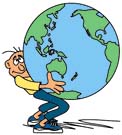Mapping Essentials
![]()

Mapping Essentials
![]()

Day 4
Goals:
2. Students are introduced to basic map skills and uses.
Time:
Resources/Materials:
Procedure:
2. Maps are important tools in the Caribbean especially because the nations are islands and there would be no other way to find out where they are in proximity to each other. The mapping essentials that will be discussed are important because they will help the students to accurately place their island on a large scale map later in the day. The students will be making a map of the Caribbean at the end of the day.
3. Begin by focusing on a class map in front of the room. As the different essentials are discussed, apply them to the larger class map either by drawing or by pointing out each tool as they are discussed and explained. This way, the students can sequentially see the tools and how they work together.
4. Include in the discussion - mapping keys, compass rose, the grid system, and latitude and longitude along with coordinates. Place (if you haven't already) an unmarked world map in front of the class so both they and the teacher can build.
5. Ask the students to define direction. Direction is an important concept for further use in the active mapping activity in a later lesson. Define headings from 0 to 360 degrees. Explain the grid system by applying it to the class map so students can see how it is divided up. Discuss latitude and longitude including the numbers (degrees) to place things on a map - coordinates. At the end, the students should see a full scale map in front of them that has been built on. Ask the students to place certain cities on the map by reading off coordinates with which the students place on the map in front of the class.
Assessment:
Rubric
3 The student accurately applies the learned information gathered for placing the points and gives the correct location with little difficulty.
2 The student makes significant errors in the interpretation of the information gathered for placing points on the map and is awkward in showing how to use the tools.
1 The student grossly misinterprets information on mapping or gives no attempt to synthesize the information and fails to apply it.
(Adopted from Green Bay Area Schools)
Curricular Strands:
Social Studies - places in the world
Math - matching longitude and latitude to place cities on a world map
Communication / Interpretation - synthesis of information given to use in placing cities
This page submitted by St. Norbert College Ocean Voyagers Program